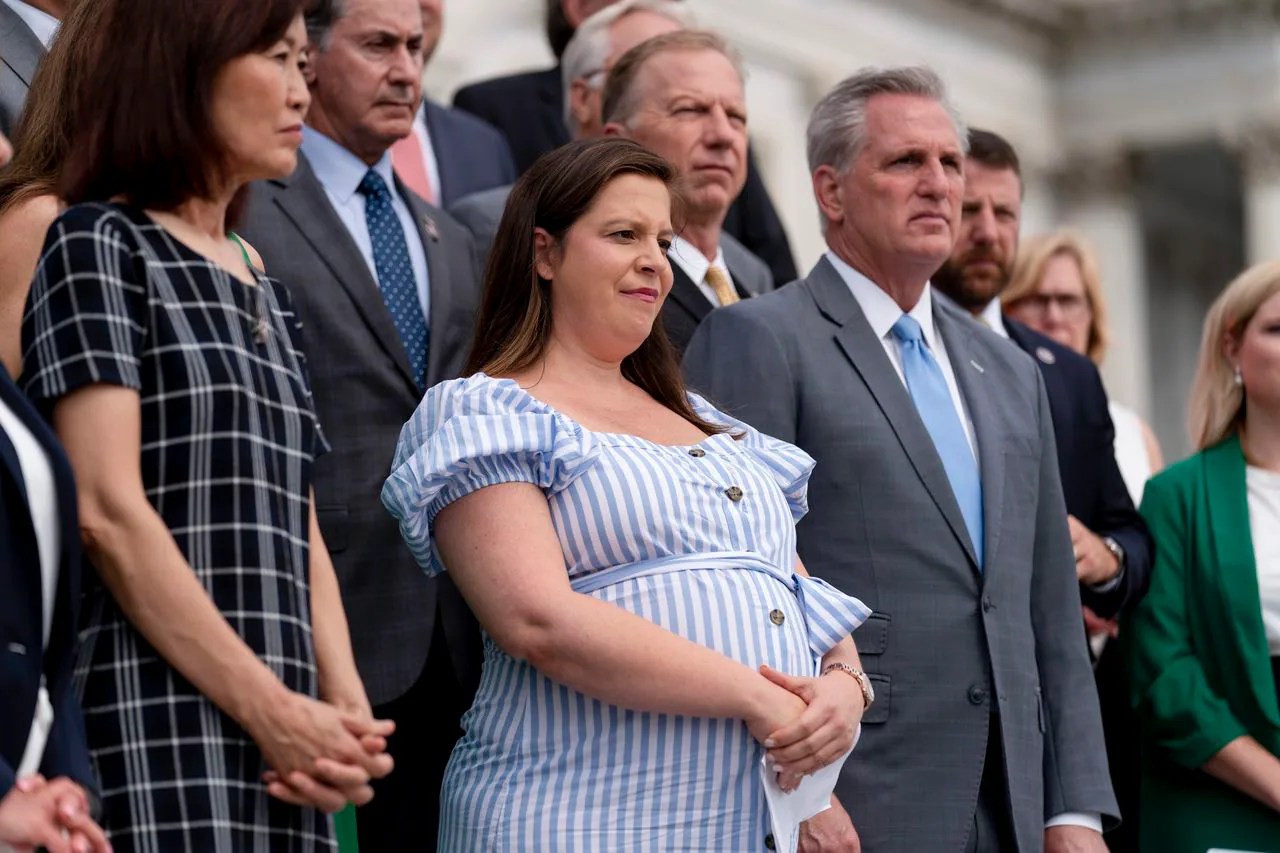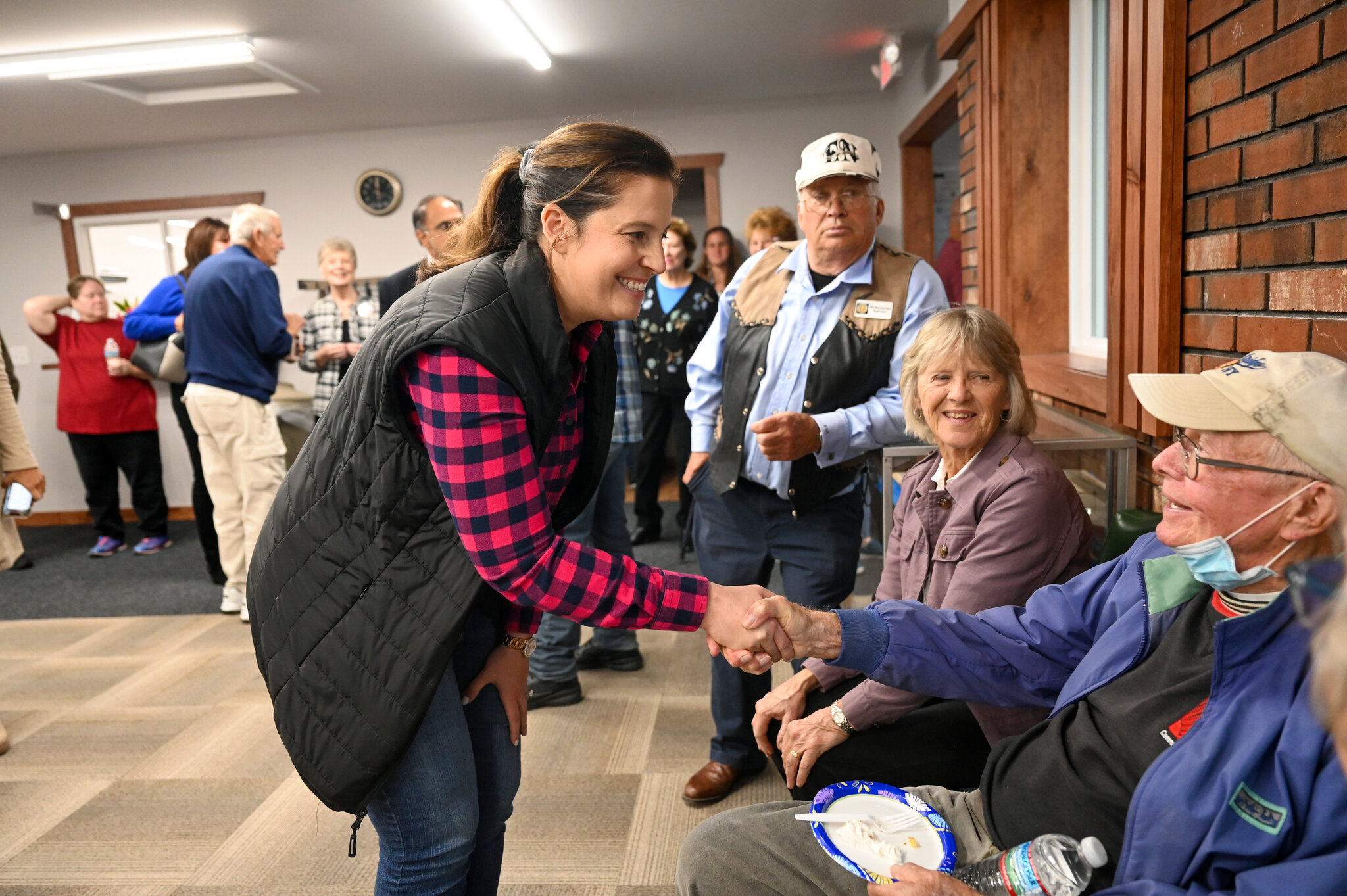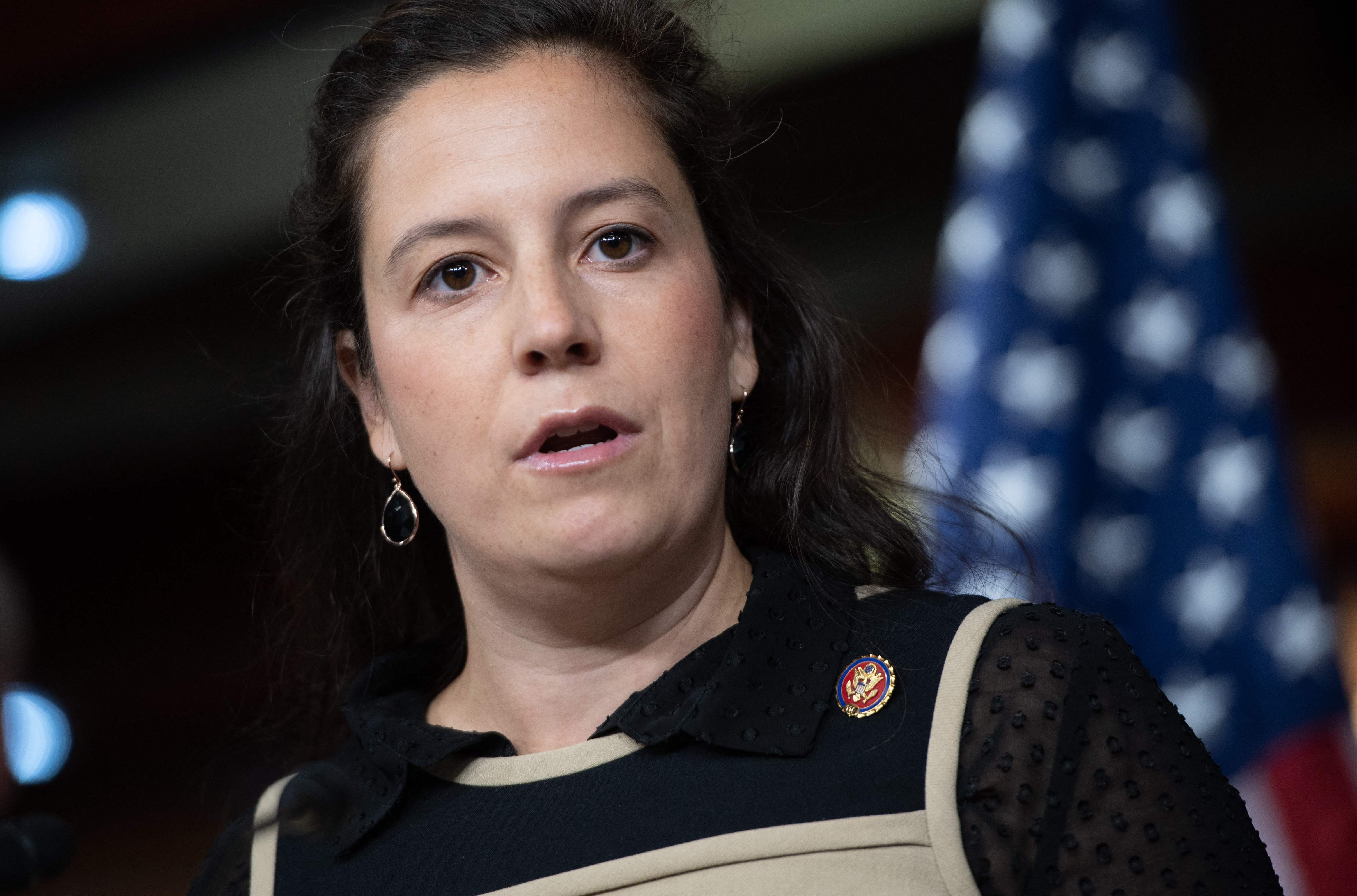Elise Stefanik Catholic is a term used to describe the religious affiliation of Elise Stefanik, an American politician who has served as the U.S. Representative for New York's 21st congressional district since 2015. Stefanik is a practicing Catholic and has been open about her faith, speaking about its influence on her personal and political life.
Stefanik's Catholic faith is relevant to her role as a politician as it informs her views on a range of issues, including abortion, same-sex marriage, and religious freedom. She is a member of the House GOP Doctors Caucus, a group of Republican members of Congress who are physicians and support pro-life policies.
The issue of religion in politics has been a topic of debate in the United States for centuries. In recent years, there has been a growing trend of politicians openly discussing their faith and its impact on their work. This is likely due in part to the increasing diversity of religious beliefs in the country, as well as the growing influence of religious groups in politics.
Elise Stefanik Catholic
Elise Stefanik's Catholic faith is an important part of her personal and political life. Here are eight key aspects of her Catholicism:
- Pro-life
- Supports traditional marriage
- Believes in religious freedom
- Member of the House GOP Doctors Caucus
- Regularly attends Mass
- Prays the rosary daily
- Has spoken about her faith publicly
- Her faith informs her views on a range of issues
Stefanik's Catholicism has been a topic of discussion in the media, as she is one of a growing number of politicians who openly discuss their faith. She has said that her faith is "a source of strength and guidance" for her, and that it informs her views on a range of issues, including abortion, same-sex marriage, and religious freedom.
| Name | Elise Stefanik |
|---|---|
| Born | July 2, 1984 |
| Birthplace | Albany, New York |
| Education | Harvard University, Georgetown University Law Center |
| Occupation | Politician |
| Political party | Republican |
| Religion | Catholic |
Pro-life
Elise Stefanik is a pro-life Catholic who believes that abortion is morally wrong and should be illegal in most cases. Her pro-life stance is based on her belief that every human life is sacred and that unborn children have the right to life. Stefanik has said that she believes "abortion is the intentional killing of an innocent human being" and that it is "a grave moral evil."
Stefanik's pro-life views have been criticized by some, who argue that they are out of step with the majority of Americans. However, Stefanik maintains that her views are in line with the teachings of the Catholic Church and that she is simply standing up for the rights of the unborn.
Stefanik has a long history of supporting pro-life causes. She has voted for legislation to defund Planned Parenthood, and she has co-sponsored legislation to ban late-term abortions. Stefanik has also spoken out against the use of embryonic stem cells for research.
Stefanik's pro-life views are an important part of her Catholic faith. She believes that every human life is sacred and that unborn children have the right to life. Stefanik's pro-life views have been criticized by some, but she maintains that they are in line with the teachings of the Catholic Church and that she is simply standing up for the rights of the unborn.
Supports traditional marriage
Elise Stefanik is a Catholic who supports traditional marriage. This means she believes that marriage is a union between one man and one woman. Stefanik's views on marriage are based on her religious beliefs. The Catholic Church teaches that marriage is a sacrament that is indissoluble. This means that once a couple is married, they are married for life.
Stefanik's support for traditional marriage has been criticized by some, who argue that it is discriminatory against same-sex couples. However, Stefanik maintains that her views are in line with the teachings of the Catholic Church and that she is simply standing up for the traditional definition of marriage.
Stefanik's support for traditional marriage has also been criticized by some who argue that it is out of step with the majority of Americans. However, Stefanik maintains that her views are in line with the teachings of the Catholic Church and that she is simply standing up for the traditional definition of marriage.
Stefanik's support for traditional marriage is an important part of her Catholic faith. She believes that marriage is a sacred union between one man and one woman. Stefanik's views on marriage are based on her religious beliefs and she is simply standing up for the traditional definition of marriage.
Believes in religious freedom
Elise Stefanik is a Catholic who believes in religious freedom. This means she believes that all people have the right to practice their religion freely, without government interference. Stefanik's belief in religious freedom is based on her religious beliefs. The Catholic Church teaches that religious freedom is a fundamental human right.
Stefanik's belief in religious freedom has led her to support policies that protect religious freedom. For example, she has co-sponsored legislation to protect the rights of religious minorities in the United States. Stefanik has also spoken out against religious persecution around the world.
Stefanik's belief in religious freedom is an important part of her Catholic faith. She believes that all people have the right to practice their religion freely, without government interference. Stefanik's belief in religious freedom has led her to support policies that protect religious freedom both in the United States and around the world.
The connection between "Believes in religious freedom" and "elise stefanik catholic" is clear. Stefanik's Catholic faith is the basis for her belief in religious freedom. This belief has led her to support policies that protect religious freedom both in the United States and around the world.
Member of the House GOP Doctors Caucus
Elise Stefanik is a member of the House GOP Doctors Caucus, a group of Republican members of Congress who are physicians and support pro-life policies. Stefanik's membership in this caucus is significant because it reflects her commitment to her Catholic faith and her pro-life beliefs.
The House GOP Doctors Caucus is a caucus of Republican members of Congress who are physicians. The caucus was founded in 2017 and has over 100 members. The caucus's mission is to "promote the pro-life, pro-family values of the Republican Party."
Stefanik's membership in the House GOP Doctors Caucus is a practical application of her Catholic faith. As a member of the caucus, Stefanik is able to work with other pro-life members of Congress to advance legislation that protects the unborn. For example, Stefanik has co-sponsored legislation to ban late-term abortions and to defund Planned Parenthood.
The connection between "Member of the House GOP Doctors Caucus" and "elise stefanik catholic" is clear. Stefanik's Catholic faith is the basis for her pro-life beliefs. Her membership in the House GOP Doctors Caucus is a practical application of her pro-life beliefs.
Regularly attends Mass
Regularly attending Mass is an important part of Elise Stefanik's Catholic faith and has implications for her personal life, political views, and public service. It encompasses several key aspects, each with its own significance.
- Spiritual nourishment
Attending Mass provides Stefanik with spiritual nourishment and guidance. It allows her to connect with her faith, reflect on her values, and seek strength and inspiration in her daily life.
- Sense of community
Mass fosters a sense of community and belonging for Stefanik. It connects her with other Catholics, allowing her to share her faith and build relationships with like-minded individuals.
- Moral compass
Stefanik's regular attendance at Mass helps her to stay grounded in her moral compass. The teachings and values she hears during Mass guide her decisions and actions, both in her personal life and in her role as a public servant.
- Political influence
While Stefanik's Catholic faith does not dictate her political views, it does inform her approach to certain issues. Her regular attendance at Mass helps her to remain connected to her faith and the teachings of the Catholic Church, which in turn influences her views on matters such as abortion, same-sex marriage, and religious freedom.
In conclusion, Stefanik's regular attendance at Mass has a multifaceted impact on her life. It provides her with spiritual nourishment, a sense of community, a moral compass, and influences her political views. These aspects collectively contribute to her identity as a Catholic and shape her personal and professional choices.
Prays the rosary daily
Praying the rosary daily is a cornerstone of Elise Stefanik's Catholic faith and a reflection of her deep devotion. It holds profound personal and spiritual significance for her, shaping her worldview and influencing her actions both as an individual and a public servant. Here are some key facets of her daily rosary practice:
- Spiritual connection
Through the rosary, Stefanik seeks a deeper connection with God and the divine. It allows her to center herself, reflect on her faith, and find strength and guidance in her daily life.
- Contemplative practice
Praying the rosary is a contemplative practice that helps Stefanik to slow down, focus on the present moment, and meditate on the mysteries of Christ's life. It provides her with an opportunity for introspection and spiritual growth.
- Intercession for others
Stefanik often prays the rosary with specific intentions, interceding for the well-being of others, whether it be her constituents, her family, or those in need around the world.
- Tradition and heritage
The rosary is a centuries-old Catholic tradition that Stefanik embraces as part of her cultural and religious heritage. Praying the rosary connects her to a wider community of believers and strengthens her sense of belonging.
In summary, praying the rosary daily is an integral part of Stefanik's Catholic identity. It nourishes her spiritual life, provides a contemplative outlet, allows her to intercede for others, and connects her to her heritage. Through this practice, she seeks closeness to God, personal growth, and a deeper understanding of her faith.
Has spoken about her faith publicly
Elise Stefanik's public discussion of her Catholic faith has been a defining characteristic of her political career. She has spoken openly about her beliefs on various platforms, including interviews, speeches, and social media. This has had a significant impact on her image and her relationship with constituents.
Stefanik's willingness to discuss her faith has allowed her to connect with voters on a personal level. In a political climate where many candidates shy away from discussing their religious beliefs, Stefanik's openness has been refreshing to many. It has also helped her to build a strong base of support among Catholic voters.
However, Stefanik's public discussion of her faith has also drawn criticism from some. Some have accused her of using her religion to appeal to voters, while others have questioned whether it is appropriate for a politician to speak so openly about their religious beliefs. Despite these criticisms, Stefanik has continued to speak about her faith, arguing that it is an important part of her life and her identity.
Stefanik's experience demonstrates the complex relationship between religion and politics in the United States. While many Americans are uncomfortable with the idea of mixing religion and politics, others see it as a natural and even necessary part of public discourse. Stefanik's willingness to speak about her faith has helped to open up a dialogue about the role of religion in American politics.
Her faith informs her views on a range of issues
Elise Stefanik's Catholic faith is a central part of her identity and has a significant impact on her political views. She has stated that her faith informs her views on a range of issues, including abortion, same-sex marriage, and religious freedom. For example, Stefanik is a strong supporter of pro-life policies and has co-sponsored legislation to ban late-term abortions. She has also spoken out against same-sex marriage, arguing that it is not in line with her Catholic beliefs. Additionally, Stefanik is a strong supporter of religious freedom and has co-sponsored legislation to protect the rights of religious minorities.
Stefanik's faith-based views have been both praised and criticized. Some constituents and fellow politicians have commended her for her willingness to stand up for her beliefs, while others have accused her of being out of step with the majority of Americans. However, Stefanik has maintained that her faith is an important part of her life and that she will continue to let it guide her decisions as a public servant.
Stefanik's experience demonstrates the complex and often controversial relationship between religion and politics in the United States. While many Americans believe that religion should play no role in government, others argue that it is an important part of the public square. Stefanik's willingness to speak openly about her faith has helped to open up a dialogue about the role of religion in American politics.
This article has explored the various aspects of "elise stefanik catholic," providing insights into her religious beliefs and their impact on her personal and political life. Key points that emerge include:
- Stefanik's Catholic faith is a central part of her identity and informs her views on a range of issues, including abortion, same-sex marriage, and religious freedom.
- Stefanik has been open about her faith, speaking about it publicly and using it to guide her decisions as a public servant.
- Stefanik's faith-based views have been both praised and criticized, reflecting the complex relationship between religion and politics in the United States.
Stefanik's experience highlights the ongoing debate about the role of religion in American society and politics. As the country continues to grapple with issues of religious freedom, social justice, and the separation of church and state, Stefanik's journey serves as a reminder that faith remains a powerful force in shaping individual lives and public discourse.
Russell westbrook mom
Louise verneuil the voice
Benjamin beatty age



ncG1vNJzZmiflaPHb7%2FFqGlnnJmctrWty6ianpmeqL2ir8SsZZynnWSyrbXSnmSsrJWbrq%2B1ymaamqyYpLmqr42hq6ak